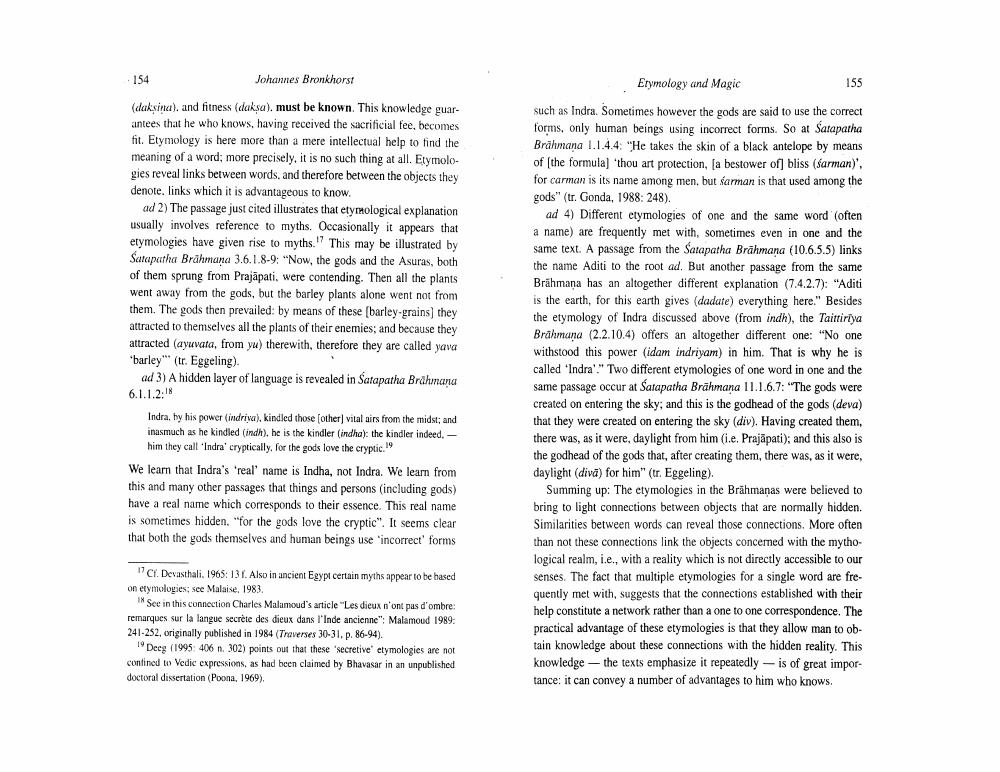Book Title: Etymology And Magic Yaskas Nirukta Flatos Cratylus And Riddle Of Semanticetymologies Author(s): Johannes Bronkhorst Publisher: Johannes Bronkhorst View full book textPage 5
________________ 154 Johannes Bronkhorst Erymology and Magic 155 (daksina), and fitness (dakşa), must be known. This knowledge guar antees that he who knows, having received the sacrificial fee, becomes fit. Etymology is here more than a mere intellectual help to find the meaning of a word, more precisely, it is no such thing at all. Etymolo. gies reveal links between words, and therefore between the objects they denote, links which it is advantageous to know. ad 2) The passage just cited illustrates that etymological explanation usually involves reference to myths. Occasionally it appears that etymologies have given rise to myths." This may be illustrated by Satapatha Brāhmana 3.6.1.8-9: "Now, the gods and the Asuras, both of them sprung from Prajāpati, were contending. Then all the plants went away from the gods, but the barley plants alone went not from them. The gods then prevailed: by means of these [barley-grains they attracted to themselves all the plants of their enemies; and because they attracted (ayuvata, from yu) therewith, therefore they are called yava 'barley* (tr. Eggeling) ad 3) A hidden layer of language is revealed in Satapatha Brahmana 6.1.1.2.18 such as Indra. Sometimes however the gods are said to use the correct forms, only human beings using incorrect forms. So at Satapatha Brahmana 1.1.4.4: "He takes the skin of a black antelope by means of the formula) thou art protection, (a bestower of] bliss (šarman). for carman is its name among men, but Karman is that used among the gods" (tr. Gonda, 1988: 248). ad 4) Different etymologies of one and the same word (often a name) are frequently met with, sometimes even in one and the same text. A passage from the Satapatha Brāhmana (10.6.5.5) links the name Aditi to the root ad. But another passage from the same Brahmana has an altogether different explanation (7.4.2.7): "Aditi is the earth, for this earth gives (dadate) everything here." Besides the etymology of Indra discussed above (from indh), the Taittiriya Brahmana (2.2.10.4) offers an altogether different one: "No one withstood this power idam indriyam) in him. That is why he is called 'Indra'. Two different etymologies of one word in one and the same passage occur at Satapatha Brahmana 11.1.6.7: "The gods were created on entering the sky, and this is the godhead of the gods (deva) that they were created on entering the sky (div). Having created them, there was, as it were, daylight from him (.e. Prajāpati), and this also is the godhead of the gods that, after creating them, there was, as it were, daylight (divā) for him" (tr. Eggeling). Summing up: The etymologies in the Brahmanas were believed to bring to light connections between objects that are normally hidden. Similarities between words can reveal those connections. More often than not these connections link the objects concemed with the mythological realm, i.e., with a reality which is not directly accessible to our senses. The fact that multiple etymologies for a single word are frequently met with, suggests that the connections established with their help constitute a network rather than a one to one correspondence. The practical advantage of these etymologies is that they allow man to obtain knowledge about these connections with the hidden reality. This knowledge the texts emphasize it repeatedly - is of great importance: it can convey a number of advantages to him who knows. Indra, by his power indriya), kindled those other vital airs from the midst; and inasmuch as he kindled (indh), he is the kindler indha): the kindler indeed. - him they call "Indra' cryptically, for the gods love the cryptic. We learn that Indra's 'real name is Indha, not Indra. We learn from this and many other passages that things and persons (including gods) have a real name which corresponds to their essence. This real name is sometimes hidden. "for the gods love the cryptic". It seems clear that both the gods themselves and human beings use 'incorrect' forms 17C. Devasthali. 1965: 131. Also in ancient Egypt certain myths appear to be based on etymologies, see Malaise, 1983. I See in this connection Charles Malumoud's article "Les dieux n'ont pas d'ombre: remarques sur la langue secrete des dieux dans l'Inde ancienne": Malamoud 1989: 241-252, originally published in 1984 (Traverses 30-31. p. 86-94). Deeg (1995: 406 n. 302) points out that these secretive etymologies are not contined to Vedic expressions, as had been claimed by Bhavasar in an unpublished doctoral dissertation (Poona, 1969).Page Navigation
1 ... 3 4 5 6 7 8 9 10 11 12 13 14 15 16 17 18 19 20 21 22 23 24 25 26 27 28 29
